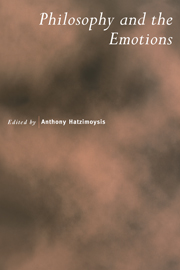Book contents
- Frontmatter
- Contents
- Preface
- Notes on Contributors
- I Emotions, Thoughts and Feelings: What is a ‘Cognitive Theory’ of the Emotions and Does it Neglect Affectivity?
- II The Emotions and their Philosophy of Mind
- III Basic Emotions, Complex Emotions, Machiavellian Emotions
- IV Emotion, Psychosemantics, and Embodied Appraisals
- V Emotions and the Problem of Other Minds
- VI Emotional Feelings and Intentionalism
- VII Emotions, Rationality, and Mind/Body
- VIII The significance of recalcitrant emotion (or, anti-quasijudgmentalism)
- IX The Logic of Emotions
- X Emotion and Desire in Self-Deception
- XI Emotion, Weakness of Will, and the Normative Conception of Agency
- XII Narrative and Perspective; Values and Appropriate Emotions
- XIII Passion and Politics
- XIV Don't Worry, Feel Guilty
- Index
I - Emotions, Thoughts and Feelings: What is a ‘Cognitive Theory’ of the Emotions and Does it Neglect Affectivity?
Published online by Cambridge University Press: 06 January 2010
- Frontmatter
- Contents
- Preface
- Notes on Contributors
- I Emotions, Thoughts and Feelings: What is a ‘Cognitive Theory’ of the Emotions and Does it Neglect Affectivity?
- II The Emotions and their Philosophy of Mind
- III Basic Emotions, Complex Emotions, Machiavellian Emotions
- IV Emotion, Psychosemantics, and Embodied Appraisals
- V Emotions and the Problem of Other Minds
- VI Emotional Feelings and Intentionalism
- VII Emotions, Rationality, and Mind/Body
- VIII The significance of recalcitrant emotion (or, anti-quasijudgmentalism)
- IX The Logic of Emotions
- X Emotion and Desire in Self-Deception
- XI Emotion, Weakness of Will, and the Normative Conception of Agency
- XII Narrative and Perspective; Values and Appropriate Emotions
- XIII Passion and Politics
- XIV Don't Worry, Feel Guilty
- Index
Summary
I have been arguing, for almost thirty years now, that emotions have been unduly neglected in philosophy. Back in the seventies, it was an argument that attracted little sympathy. I have also been arguing that emotions are a ripe for philosophical analysis, a view that, as evidenced by the Manchester 2001 conference and a large number of excellent publications, has now become mainstream. My own analysis of emotion, first published in 1973, challenged the sharp divide between emotions and rationality, insisted that we reject the established notion that the emotions are involuntary, and argued, in a brief slogan, that ‘emotions are judgments/ Since then, although the specific term ‘judgment’ has come under considerable fire and my voluntarist thesis continues to attract incredulousness the general approach I took to emotions has been widely accepted in both philosophy and the social sciences. When Paul Griffiths took on what he misleadingly characterized as ‘propositional attitude’ theories of emotion as the enemy of all that was true and scientifically worthy, I knew that we had made it. Such ferocious abuse is surely a sign that we had shifted, in Kuhnian terms, from being revolutionary to becoming the ‘normal’ paradigm. The current counter-revolution of affect programmes and neuro-reductionism says a lot about who we are and how far we have come. (Progress in philosophy is moved more by this drama of one outrageous thesis after another—once called ‘dialectic’—than by cautious, careful argument.)
The view that I represent is now generally referred to as the ‘cognitive theory of emotions,’ a borrowing from psychology and ‘cognitive science.’
- Type
- Chapter
- Information
- Philosophy and the Emotions , pp. 1 - 18Publisher: Cambridge University PressPrint publication year: 2003
- 19
- Cited by

